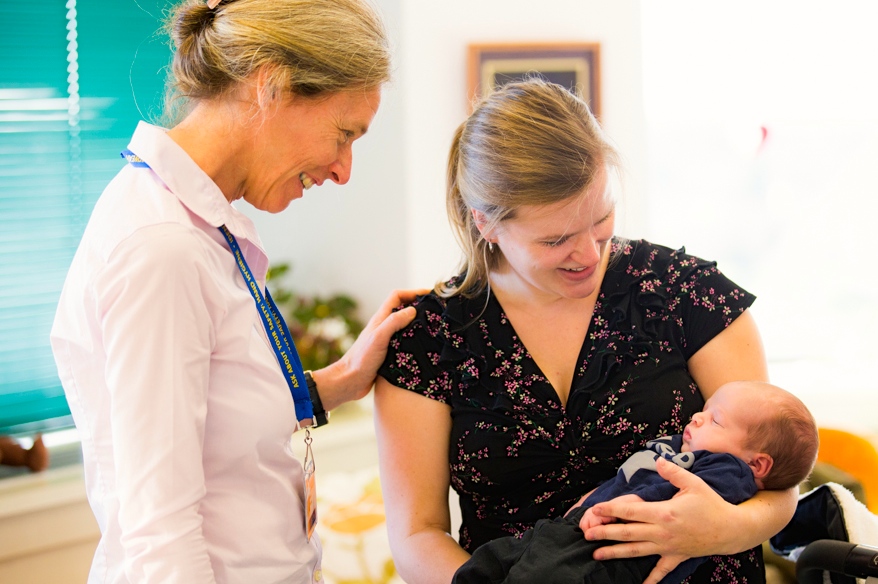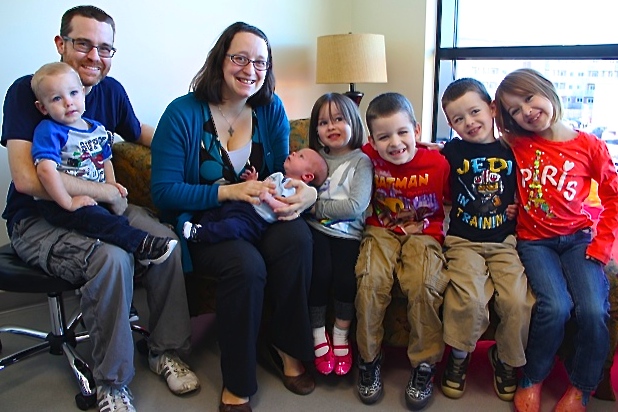Registered midwives are primary care providers and experts in the provision of care throughout pregnancy, birth, and the first six weeks postpartum for parents and infants in addition to the provision of comprehensive sexual and reproductive health care which includes contraceptive counseling and prescribing, abortion care, vaccinations, cervical cancer and STI screening, and infant feeding support. Midwives attend births in hospital and out of hospitals, in birth centres and at home.

Midwifery services offer the care pregnant people need – physical examinations and health assessments, screening and diagnostic tests, appropriate treatments and medications, information and education, labour support, delivery, care of the newborn and support for infant feeding. This includes access to related health services should they be needed, such as consultation with family physicians, obstetricians, paediatricians and other specialists.
Midwifery care is based on the principles of partnership with the client and family, informed choice, continuity of care, and choice of birthplace. Midwives are the only health professionals with specific training for safe home birth as well as hospital birth.
Research shows that midwifery care results in better outcomes for parents and babies with significantly fewer medical interventions. Midwifery care offers higher rates of vaginal birth and breast/chest feeding. Midwifery clients commonly report positive feelings about their birth experiences and more confidence in the transition to new parenthood. Clients especially appreciate the personalized support and quality of care midwives provide.
Midwifery services in Nova Scotia
Registered Midwives in Nova Scotia are integrated into the provincial health system and work collaboratively with physicians, nurses, and other health professionals to provide the best possible perinatal and newborn care. People can access midwifery care without a referral.

Midwifery services are available at the following sites:
Highland Community Midwives (Antigonish County): Four midwives provide team-based primary care, offering birth at St Martha’s Regional Hospital and at home. Midwifery services are also offered in community outreach clinics.
IWK Community Midwives (HRM): Eight midwives provide team-based primary care in the Halifax Regional Municipality. The midwifery clinic is located in Dartmouth. Midwifery clients have the option of giving birth at home or at the IWK.
South Shore Community Midwives (Lunenburg County): Four midwives provide team-based primary care across the South Shore. The midwifery clinic is located in Lunenburg. Midwifery clients have the option of giving birth at home or South Shore Regional Hospital in Bridgewater.

Midwifery Q&A
What does care with a midwife involve?
- Sexual and reproductive health care: Midwives provide comprehensive sexual and reproductive health care which includes contraceptive counseling and prescribing, abortion care, vaccinations, cervical cancer and STI screening, and infant feeding support. Globally, midwives provide care from early infancy through menopause.
- Prenatal care: Midwifery care in pregnancy includes physical examinations, prenatal tests and screens, health assessments, and information and support. Midwives spend time learning about you and your family, listening to your concerns, and explaining what to expect at each stage. Regular 30-45 minute appointments are scheduled once a month up to 28 weeks, every two weeks until 36 weeks, then weekly until the birth (schedule may be altered due to COVID-19). Midwives are always on-call and can be reached 24 hours a day.
- Labour and birth care: If your pregnancy is low risk you can choose to give birth at home or in hospital. In either setting, a midwife will be with you providing continuous support, care, and monitoring through active labour, birth, and the immediate postpartum. A second midwife or a registered nurse will also be there to assist at the delivery.
- Postnatal care: Midwifery care continues for six weeks after birth. Midwives make home visits in the first few days and follow up with further appointments in the midwifery clinic to make sure you are doing well physically and emotionally, check in with your baby’s health and growth, and provide feeding support. Midwives remain on call 24/7 for their clients. After six weeks, you will be discharged back in to the care of a Family Physician or Nurse Practitioner. The first visit your baby will have with a Family Physician or NP is typically at eight weeks for their first vaccinations.
Do I have to pay for midwifery care?
Midwifery services are free for Nova Scotia residents with provincial medical services coverage (MSI). Midwives, like doctors and nurses, are part of the publicly funded health care system. If you do not have status or an MSI (health) card, please contact the individual midwifery clinic who can put you in touch with the hospital’s billing department to discuss payment options.
When should I contact a midwife? Do I need a referral?
Because the demand for midwifery care is high, it is best to contact a midwifery practice as soon as you find out you are pregnant. It is also beneficial to start prenatal care early in your pregnancy. You can fill out an intake form and make an appointment to see a midwife without a referral.
How do midwives choose who to take in to care?
Midwives in Nova Scotia prioritize “priority populations” for midwifery care; if you feel comfortable, please self-identify as one of the groups listed below.
- Indigenous
- African Nova Scotian/Black
- Facing poverty/food insecurity/inadequate housing
- Facing social isolation/lack of social support due to language, rural location, refugee status or recent immigrant, having a partner employed out-of-province, the absence of other family supports, or cultural barriers, history or current incarceration
- Single parents
- Adolescent/young parents
- LGBTQ+ families, trans and non-binary families
- Less than a high school education
- Cognitive, physical, or behavioural disabilities
- History or current abuse
- History or current addiction/substance use
- Mental health conditions
- History of trauma related to pregnancy or childbirth
- Planning vaginal birth after caesarean/trial of labour after caesarean
- Planning homebirth
Can I have both a midwife and a doctor?
You can choose either a midwife or a doctor (family physician or obstetrician) to be your primary care provider. When you have a midwife, they are your primary care provider during pregnancy, birth, and the postpartum, and you will not need to see a doctor unless there is a reason to consult.
Can midwives do the same kinds of tests as doctors?
Yes. Midwives arrange all the necessary screens and tests in pregnancy including ultrasound, blood tests and genetic screening, as well as standard tests for newborns. Your midwife will discuss the results with you and provide the information and follow-up you need. If you require more extensive or invasive testing or monitoring, your midwifery team will organize referrals as needed. Midwives in Nova Scotia can prescribe medications and treatments as needed in pregnancy and the postpartum.
What if there is a problem with my pregnancy or birth?
If a health concern or complication arises during pregnancy, during birth, or afterwards, your midwifery team will consult or refer to a physician as needed (see Indications for Consultation or Transfer of Care from the Midwifery Regulatory Council). Your midwifery team will continue to provide support and appropriate care for you and your baby (for example, after a caesarean section). Midwives are trained to identify early signs of complications, manage emergencies, and ensure that you receive the necessary care.
I’m over 35. Am I too high-risk to have a midwife?
Healthy pregnant people of any age can have a midwife. People over 35 may be offered extra screening tests but the majority of pregnancies and births at all ages are normal and low risk.
If I have a midwife can I still have an epidural?
Yes. Midwives offer a range of comfort and pain relief options for labour, including access to epidurals in hospital. Midwifery skills and continuous support during labour often reduce the need for pharmaceutical pain relief.
What is the difference between a midwife and a doula?
Doulas offer emotional and practical support during labour but are not trained to provide medical or midwifery care or deliver babies. For people who want extra support, a doula can be a positive addition to the birth team. Since doula services are not part of the health care system or covered by MSI, you would find and pay for a doula yourself. We encourage you to contact the Nova Scotia Doula Association to be connected with one of the fantastic doulas in our province.
How many midwives are there in Nova Scotia?
There are 16 funded midwifery positions in the province. Midwives provide care in team-based models; most midwifery practices in Nova Scotia offer clients a team with four midwives who share care for their clients. There are also many midwives from Nova Scotia who currently work in other provinces and are eager to come home to practice.